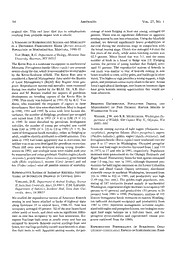
A summary of reproductive success and mortality in a disturbed ferruginous hawk (Buteo regalis) population in northcentral Montana, 1990-1992 PDF
Preview A summary of reproductive success and mortality in a disturbed ferruginous hawk (Buteo regalis) population in northcentral Montana, 1990-1992
. 94 Abstracts VoL. 27, No. 1 original site. This owl later died due to complications centage of nests fledging at least one young, averaged 69 resulting from probable impact with a vehicle. percent. There was no significant difference in apparent nesting success by nest boxorientation. Using the Mayfield A Summary of Reproductive Success and Mortality method, we detected significantly lower probabilities of IN A Disturbed Ferruginous Hawk {Buteo recalis) survival during the incubation stage in comparison with Population in Northcentral Montana, 1990-92 the brood rearing stage. Glutch size averaged 4.8 over the five years of the study, while mean hatching success was Van Horn, R.G. DepMarTtment ofBiology, Montana State 62.5 percent. Mean brood size was 3.1, and the mean University, Bozeman, 59717 number of birds in a brood to fledge was 2.9. Fledging The Kevin Rim is a sandstone escarpment in northcentral success, the percent of young hatched that fledged, aver- Montana. Ferruginous hawks {Buteo regalis) are common aged 91 percent. The reproductive success of kestrels in nesters alongthe rim, which is surrounded forseveralmiles our study was similar to that of kestrels nesting in nest by the Kevin-Sunburst oilfield. The Kevin Rim area is boxes attached to trees, utility poles, and buildings in other considered a Special Management Area under the Bureau states. The highway sign provides a strong support, a high of Land Management’s (BLM) Key Raptor Area pro- perch, and predators cannoteasily climb to the nest. Across gram. Reproductive success and mortality were examined Iowa’s agricultural landscape, nest boxes on interstate signs during two studies funded by the BLM. Dr. A.R. Har- have given kestrels nesting opportunities that would not mata and M. Restani studied the impacts of petroleum exist otherwise. development on breeding raptors of the Kevin Rim in 1990. This study was followed in 1991-92 by R.G. Van Horn, who examined the responses of raptors to these Breeding Distribution, Population Trends, and disturbances. Nest siteswereobserved from Mayto August Management of Five Diurnal Raptor Species in in 1990, 1991 and 1992. In areas with little human dis- Washington State turbance, the number of fledglings produced per occupied Watson, J.W. and K.R. McAllister. Washington De- nest varied from 2.20 in 1991 {N = 6) to 0.08 (TV =11) partment of Wildlife, 600 Capitol Way TV., Olympia, WA in 1990. In areas disturbed by petroleum development 98501-1091 activities, the number of young per occupied nest varied from 2.60 in 1990 (V = 12) to 1.0 in 1992 (N = 9). No Statewide nesting surveys of bald eagles {Haliaeetus leu- cases of ferruginous hawk mortality, either as fledgling or cocephalus), peregrine falcons {Falco peregrinus), osprey adult, could be directly attributed to oilfield activities. Two {Pandion haliaetus), golden eagles {Aquila chrysaetos), and nests in 1992 had losses apparently due to starvation, but ferruginous hawks {Buteo regalis) were conducted over the neither was in an area developed for petroleum extraction. past 8 to 17 years in Washington. Occupied peregrine Three cliff nests were destroyed during strong thunder- falcon and bald eagle territories increased from 1 and 114 storms in 1992, and multiple nests were raided each year in 1975, to 17 and 444 in 1991, respectively. Population by mammalian and avian predators. Golden eagles {Aquila increases were pronounced on the Olympic Peninsula and chrysaetos), prairie falcons {Falco mexicanus), great horned Puget Sound. Productivity levels for both species remained owls {Bubo virginianus), coyotes {Canis latrans) and red near 1.0 yng./occ. terr. in 1991, although depressed pro- fox {Vulpes vulpes) were all possible sources of mortality. ductivity for bald eagles continued on the Lower Golumbia River and Hood Ganal. Osprey territories, distributed Reproductive Success of American Kestrels Nesting statewide except in southeast Washington, increased from Along an Interstate Highway in Gentral Iowa 226 in 1984 to 412 in 1989, and productivity was high (1.49 yng./occ. terr.). The golden eagle population, con- Varland, D.E. Department of Animal Ecology, Science sisting of 187 territories located mainly in northcentral II, Iowa State University, Ames, lA 50011 T.M. LOUGHIN. Washington, experienced slight decreases inoccupancy (49 Department of Statistics, Snedecor Hall, Iowa State Uni- percent to 41 percent) and productivity (33 percent to 26 versity, Ames, IA 50011 percent) from 1985 to 1990. Preliminary analysis of 103 We studied the reproductive success of American Kestrels historic ferruginous hawk territories in eastern Washing- nesting in nest boxes attached to backs of highway signs ton indicated decreased occupancy and productivity from along Interstate 35 in central Iowa, 1988-92. Nest box 1987 to 1992. Statewide management activities empha- occupancy averaged 45 percent. All of the nest boxes faced sized bald eagles andperegrine falcons; twobiologists man- either north or south, and there was no significant differ- aged bald eagle habitats on a full-time basis, and the ence in nest box occupancy by nest box orientation. Eu- peregrine eyrie-attendant and captive-bred release pro- ropean Starlings built nests in nearly every nest box not grams continued from the 1980s. occupied by kestrels. Kestrels evicted starlings from nest boxes, but starlings probably caused some kestrels to aban- Reproductive Performance of Burrowing Owls don their nests as well. Apparent nesting success, the per- {Athenecunicularia): Effects of Supplementary Food
